CPA-21-02 C++ Institute CPA - C++ Certified Associate Programmer Free Practice Exam Questions (2026 Updated)
Prepare effectively for your C++ Institute CPA-21-02 CPA - C++ Certified Associate Programmer certification with our extensive collection of free, high-quality practice questions. Each question is designed to mirror the actual exam format and objectives, complete with comprehensive answers and detailed explanations. Our materials are regularly updated for 2026, ensuring you have the most current resources to build confidence and succeed on your first attempt.
What happens when you attempt to compile and run the following code?
#include
#include
using namespace std;
class Base
{
string s;
public:
Base() { s="Sample text";}
Base(string s) { this?>s=s; }
void Print() { cout << s; }
};
int main()
{
Base *o = new Base();
o?>Print();
}
What happens when you attempt to compile and run the following code?
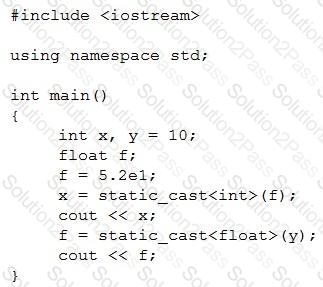
Which code line instead of the comment below will cause the program to produce the expected output?
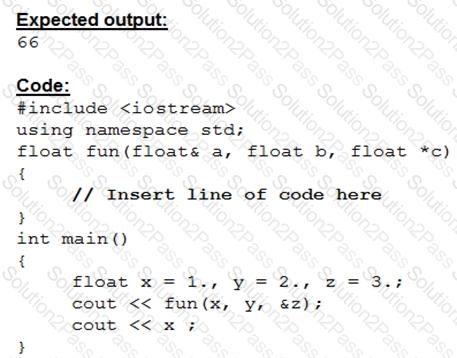
What happens when you attempt to compile and run the following code?
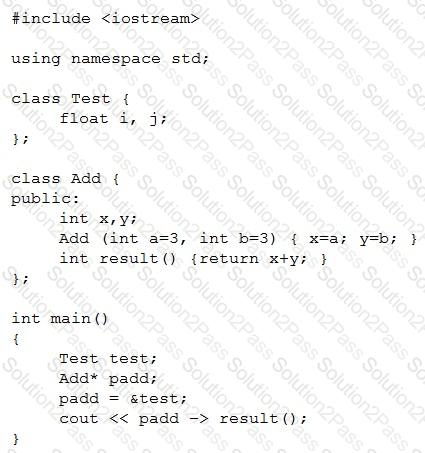
What is the output of the program?
#include
using namespace std;
#define PRINT(i) cout<<i;
int main()
{
int y=2, z=3;
PRINT(y);
PRINT(z);
return 0;
}
What happens when you attempt to compile and run the following code?
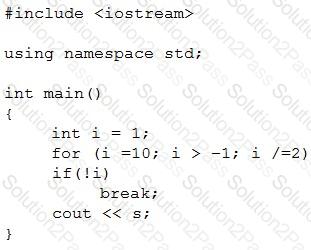
If a function, which is not a method, needs to save any value between its subsequent invocations, this can be done by: (Choose two.)
What happens when you attempt to compile and run the following code?
#include
#include
using namespace std;
void fun(int i);
int main()
{
int i=0;
i++;
for (i=0; i<=5; i++)
{
fun(i);
}
return 0;
}
void fun(int i)
{
if (i==3)
return;
cout << i;
}
What happens when you attempt to compile and run the following code?
#include
using namespace std;
int main()
{
union un
{
int x;
char c;
};
union un u1 = {10};
union un u2 = {'a'};
union un u3 = {20, 'a'};
cout<<u1.x;
cout<<u2.c;
cout<<u3.c;
return 0;
}
What happens when you attempt to compile and run the following code?
#include
#include
using namespace std;
class A {
public:
int age;
A () { age=5; };
};
class B : private A {
string name;
public:
B () { name="Bob"; };
void Print() {
cout << name << age;
}
};
int main () {
B b,*ob;
ob = &b;
ob?>age = 10;
ob?>Print();
return 0;
}
What happens when you attempt to compile and run the following code?
#include
using namespace std;
int min(int a, int b);
int main()
{
int b=10;
b = min(5,20);
cout << b;
return 0;
}
int min(int a, int b)
{
if (a return(a); else return(b); }
What happens when you attempt to compile and run the following code?
#include
#include
using namespace std;
class A {
protected:
int y;
public:
int x,z;
A() : x(2), y(2), z(1) { z = x + y; }
A(int a, int b) : x(a), y(b) { z = x + y;}
void Print() { cout << z; }
};
class B : public A {
public:
int y;
B() : A() {}
B(int a, int b) : A(a,b) {}
void Print() { cout << z; }
};
int main () {
A b;
b.Print();
return 0;
}
What will happen when you attempt to compile and run the following code?
#include
#include
using namespace std;
string fun(string, string);
int main()
{
string s="Hello";
cout << fun(s, " World");
return 0;
}
string fun(string s1, string s2)
{
return s1+s2;
}
Which code line inserted instead of the comment below will cause the program to produce the expected output?
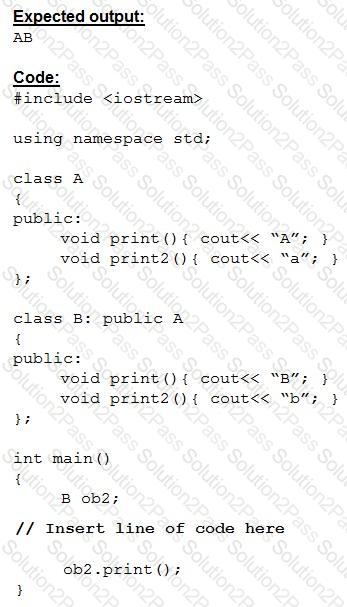
What happens when you attempt to compile and run the following code?
#include
using namespace std;
int min(int a, int b);
int main()
{
int min(int,int);
int b;
b = min(10,20);
cout << b;
return 0;
}
int min(int a, int b)
{
return(b);
}
What happens when you attempt to compile and run the following code?
#include
using namespace std;
class BaseC
{
public:
int *ptr;
BaseC() { ptr = new int(10);}
BaseC(int i) { ptr = new int(i); }
~BaseC() { delete ptr; }
};
void fun(BaseC x);
int main()
{
BaseC *o = new BaseC(5);
fun(*o);
}
void fun(BaseC x) {
cout << "Hello:"<<*x.ptr;
}
What is not inherited from the base class?
What happens when you attempt to compile and run the following code?
#include
using namespace std;
class Base {
int age;
public:
class C {
int b;
void PrintC() { cout << b; }
};
Base () {age=5;};
void setAge(int a=20) {age = a;}
void Print() { cout << age;}
};
int main () {
Base a;
a.setAge(10);
a.Print();
return 0;
}
What happens when you attempt to compile and run the following code?
#include
#include
using namespace std;
class Second;
class Base {
int age;
public:
Base () { age=5; };
friend void set(Base &ob, Second &so);
void Print() { cout << age;}
};
class Second {
string name;
public:
friend void set(Base &ob, Second &so);
void Print() { cout << name;}
};
void set(Base &ob, Second &so) {
ob.age = 0; so.name = "Bill";
}
int main () {
Base a;
Second b;
set(a,b);
a.Print();
b.Print();
return 0;
}
What happens when you attempt to compile and run the following code?
#include
#include
using namespace std;
class A {
public:
A() { cout << "A no parameters";}
A(string s) { cout << "A string parameter";}
A(A &a) { cout << "A object A parameter";}
};
class B : public A {
public:
B() { cout << "B no parameters";}
B(string s) { cout << "B string parameter";}
};
int main () {
A a2("Test");
B b1("Alan");
B b2(b1);
return 0;
}
